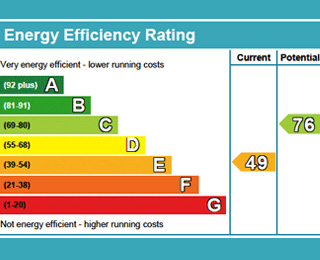What is an Energy Performance Certificate? (EPC)

The Energy Performance Certificate records the efficiency of a property. It provides an energy efficiency rating, as well as CO2 emissions, and ranges from A to G (A being the most efficient, while G is the poorest level of efficiency).
The methods for producing an EPC are standard, to enable the efficiency of one building to be easily measured against another. The certificate is useful for owners, buyers, tenants and occupiers, as they are able to see how energy efficient, and how high or low the CO2 emissions are from a building which is essentially their investment.
The EPC is valid for 10 years and now applies to anyone who wishes to install Solar PV panels, or other source of renewable technology. With energy costs rising in the UK, energy saving methods are an ideal way for households to be compensated and to even be better off.
How does an EPC affect getting Solar Panels?
From 1st April 2012, a grade D EPC has been a requirement for people wanting to claim the full 21p per KW of energy that their system produces. An energy assessor visits your home and evaluates your energy production.
Full FiT rates on solar panels require band D, meaning that your home has to be 55% energy efficient at the least.
The cost of an EPC depends on a number of factors, such as location and the size of the property. The housing market sets the rate and each property will vary.
What can I do to help me increase my rating?
In the UK, the majority of homes do already reach the required EPC rating of D or higher. If you find that your property doesnt, you can carry out some simple tasks to ensure you still qualify.
- Install thermostatic radiator valves.
- Switch from regular watt light bulbs to energy saving bulbs.
- Invest in cavity wall insulation.
- Make sure your loft is well insulated.
Solar panel systems also increase the energy efficiency of the home and can help you achieve level D on your property.
If, after making the changes recommended above, your home still does not reach the required energy efficiency, you will qualify for the FiT at a rate of 9p per unit of electricity generated and you will still feel the benefits of free electricity.
How do I obtain an EPC?
In order to obtain an EPC, you will need to contact a domestic energy assessor (DEA). There are accreditation schemes in operation to ensure legitimacy of surveyors. The DEA may be employed by an energy company or estate agent or be self-employed. You should make sure your DEA belongs to an accreditation scheme.
Landmark manage an energy performance certificate register website, on behalf of the government, and this is an ideal way of searching to an accredited DEA in your area. You can also use other online searches for DEAs or your local phone book.

 Feed in Tariffs were introduced by UK Government in 2010. The scheme compels energy suppliers to pay you for the electricity you produce via PV solar panels - and sees you paid extra for any electricity you export back to the grid.
Feed in Tariffs were introduced by UK Government in 2010. The scheme compels energy suppliers to pay you for the electricity you produce via PV solar panels - and sees you paid extra for any electricity you export back to the grid. At solarpanels.co.uk, we want to remove the confusion and mystique around solar energy. So if your queries aren't answered in other areas of the site, you'll most likely find what you're looking for here - in our Solar FAQ.
At solarpanels.co.uk, we want to remove the confusion and mystique around solar energy. So if your queries aren't answered in other areas of the site, you'll most likely find what you're looking for here - in our Solar FAQ.